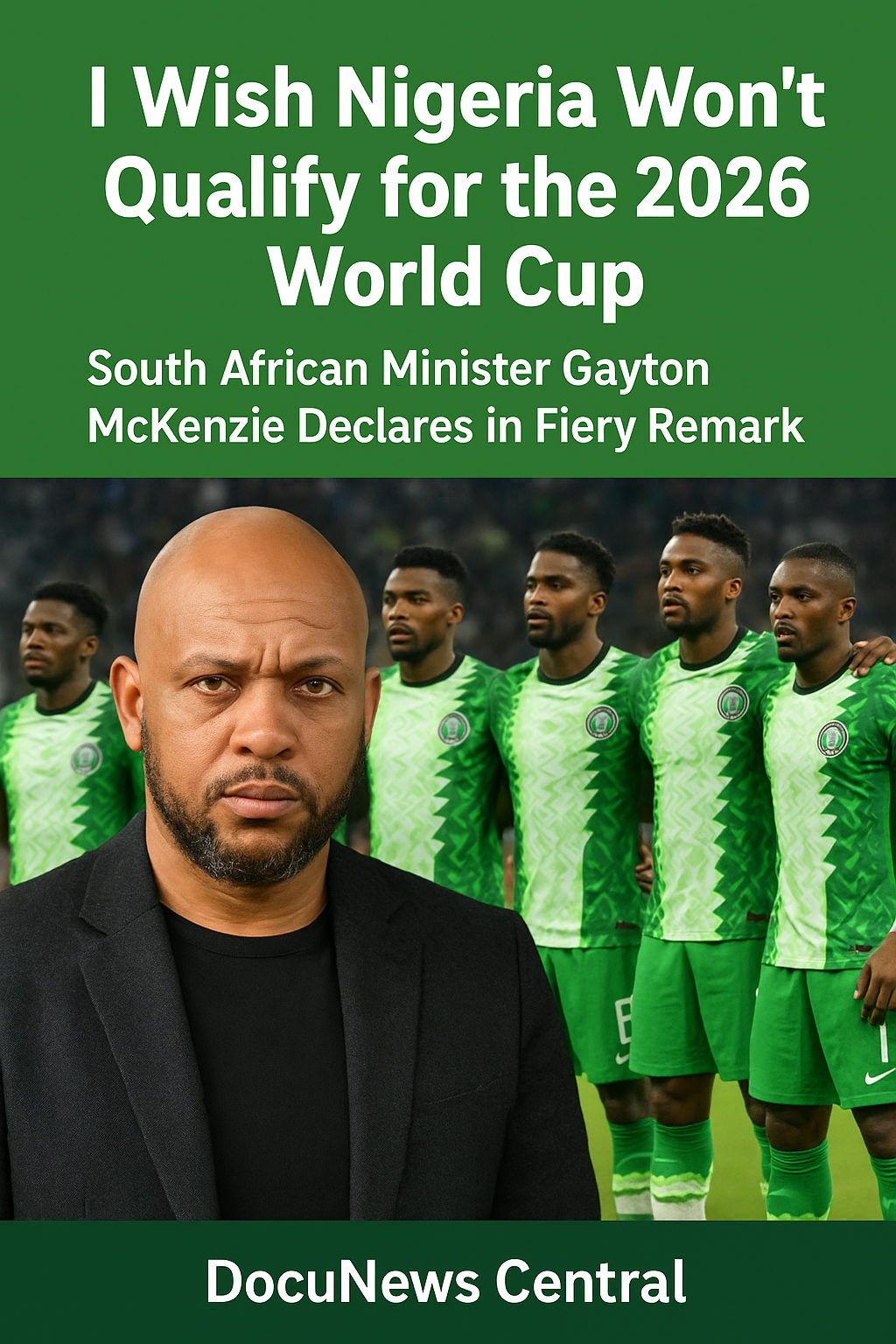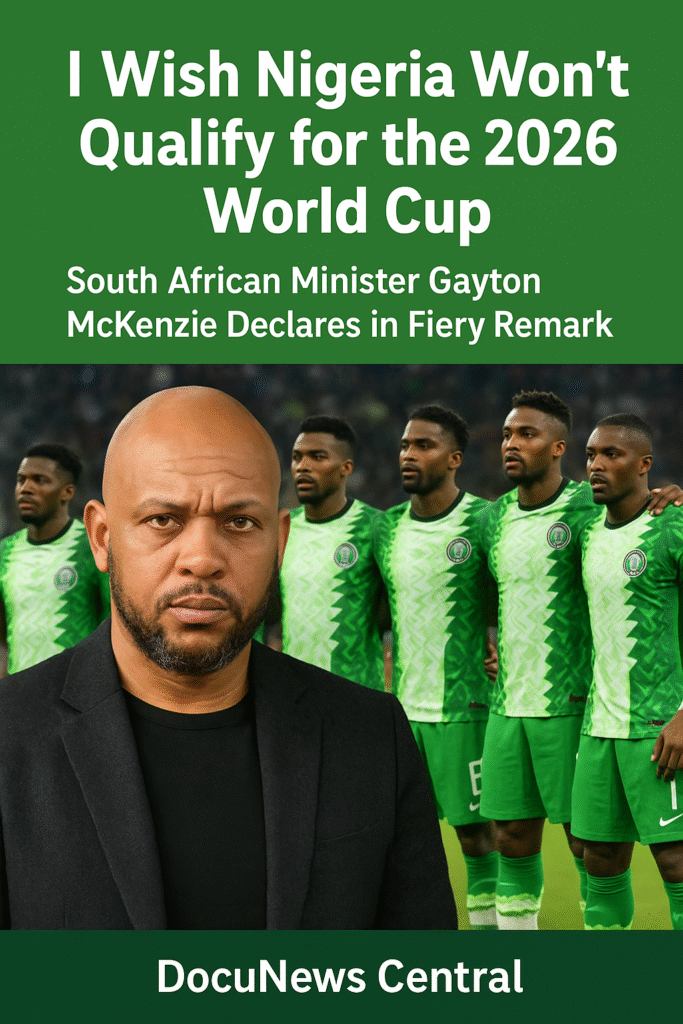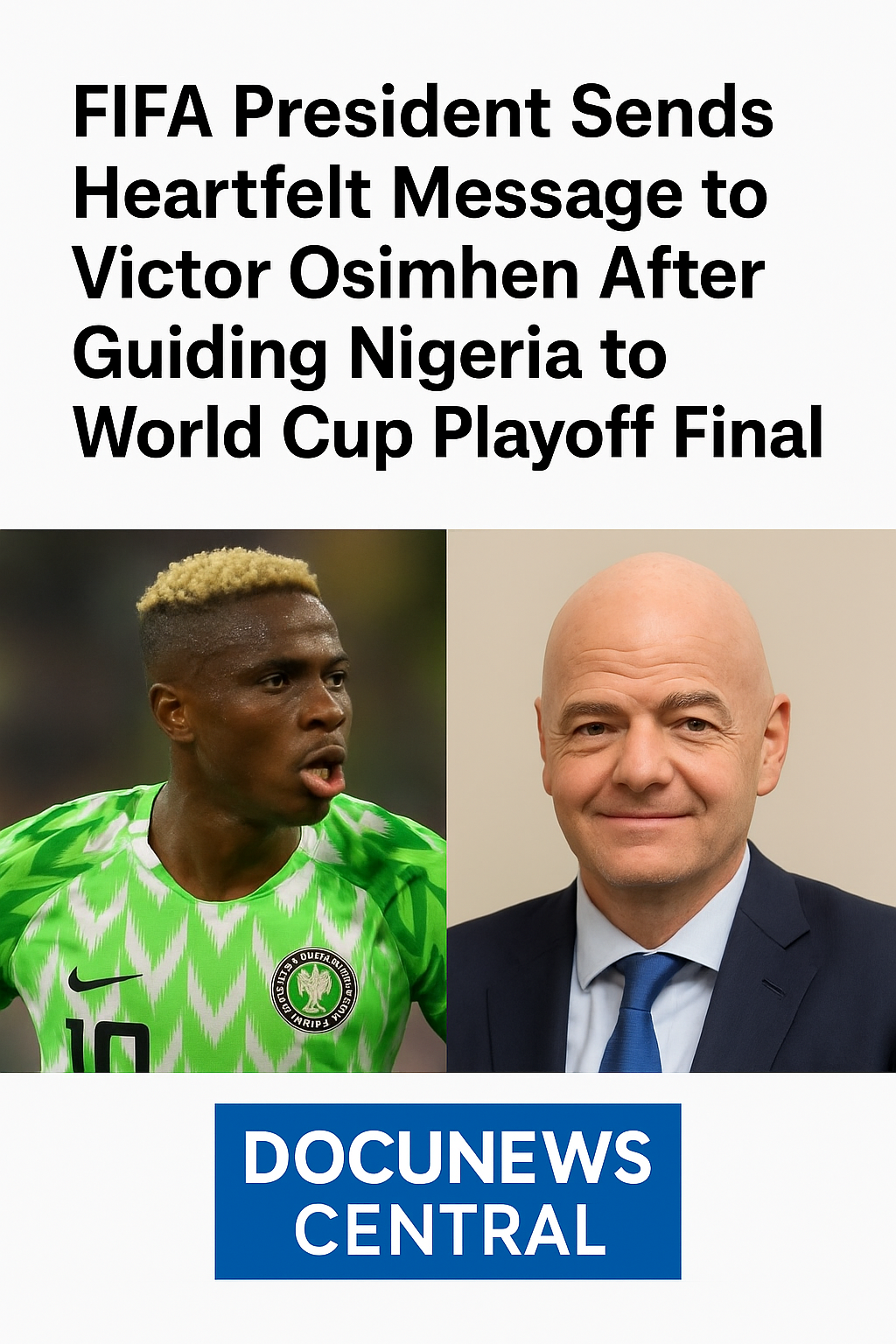
Sports | Exclusive Analysis
“I Wish Nigeria Won’t Qualify for the 2026 World Cup” — South African Minister Gayton McKenzie Declares in Fiery Remark
By DocuNews Central — October 19, 2025

South African Sports Minister Gayton McKenzie has ignited fierce debate after publicly stating that he wishes Nigeria’s Super Eagles would not qualify for the 2026 FIFA World Cup. The remark, made during a radio interview, quickly spread across social media and major news outlets, prompting reactions that range from anger to amusement across Africa.
What Gayton McKenzie actually said
During an interview on Radio 947 (Johannesburg), McKenzie said plainly:
“I want to make it very clear that I wish for them not to qualify for the 2026 FIFA World Cup.”
He accused Nigeria’s football authorities of working “behind the scenes” to frustrate South Africa’s qualification campaign, and added that he wanted another African country—not Nigeria—to progress.
Multiple reputable outlets reported the quote with matching phrasing. See coverage from PM News Nigeria, The Guardian Nigeria, and Vanguard.
Nigeria vs South Africa: a rivalry that never sleeps
The rivalry between Super Eagles and Bafana Bafana runs deep. Historic meetings—AFCON clashes and qualifiers—have produced tension, drama, and unforgettable moments. With both teams drawn into the same group for 2026 qualifying, emotions are high, and every match carries major consequence.
Public reaction: outrage, defence, and banter
Across social platforms, the response split. Many Nigerians condemned the remark as undiplomatic, saying a minister should promote unity. Some South Africans defended McKenzie as merely sharing common fan frustration. Hashtags such as #McKenzieVsNigeria and #SuperEagles trended briefly as fans and pundits debated tone, intent, and consequence.
Why the remark struck a nerve
McKenzie’s blunt style is well-known, yet the comment crossed into sensitive territory because Nigeria is a continental football heavyweight. The Super Eagles have three AFCON titles and a consistent international profile. When a public figure wishes harm—even competitively—it raises questions about sportsmanship and leadership.
Nigeria’s response: restraint and focus
The Nigeria Football Federation (NFF) chose not to escalate the controversy and issued no formal rebuttal. Former players, however, urged calm. Legendary striker Daniel Amokachi suggested that the best reply was to perform on the field. Ex-midfielder Sunday Oliseh stressed that ministers should inspire young people, not stoke hostility.
Between rivalry and politics
Observers noted the political undertone. South Africa’s team faced pressure after inconsistent results, and McKenzie’s words could rally home support. Still, critics argued that officials should avoid language that divides. As Vanguard reported, sports should unite nations, not widen political rifts.
What’s at stake in 2026 qualification
The 2026 FIFA World Cup will offer Africa nine slots—the continent’s highest allotment. Nigeria and South Africa sit in a qualifying group with Benin, Rwanda, Lesotho, and Zimbabwe. Given how tight the table has been, every match now matters hugely. Both federations know that performance, not rhetoric, will determine who goes to North America in 2026.
Media and expert reaction
Major outlets across Africa covered the remark. PM News, The Guardian, Vanguard, Sowetan Live, and Daily Maverick published similar accounts and commentary. Analysts urged leaders to model calm and to let rivalry play out on the field.
Sports diplomacy and the power of words
Words from public figures carry weight. Sports history shows leaders can heal or inflame. Nelson Mandela used sports to unify a nation; other leaders have used it for political gains. McKenzie’s statement serves as a reminder: rhetoric matters—and so does restraint.
The bigger picture: unity over division
Africa’s football future brightens when nations lift one another. Rivalry provides spice, but unity produces sustained progress. By channelling energy into development, coaching, and youth programmes, both countries can grow and shine on the world stage. Fans and officials should keep competition healthy and constructive.
Conclusion
Gayton McKenzie’s remark—“I wish Nigeria won’t qualify for the 2026 World Cup”—sparked predictable debate. Yet the clearest response came from Nigeria’s football community: perform on the pitch. As qualifying unfolds, results will drown words. For now, the continent watches, debates, and prepares for what may be one of the most compelling African qualifying stories in recent memory.
Further reading
- Nigeria Football Federation — Official site
- PM News Nigeria — Sports
- Guardian Nigeria — Football
- Vanguard — Sports
DocuNews Central — We will continue to follow this story and report verified developments. Copyright © DocuNews Central. All Rights Reserved.








